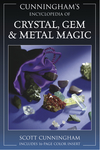The Rainbow Connection: Crystals and Color

You can tell a lot about a crystal by its color and the magical way that a crystal interacts with light. In fact, color may be the single most important factor you will need to know in order to work with crystals.
Since the 1900s, when Isaac Newton used a prism to split sunlight into a rainbow of colors, scientists have recognized that light is a form of energy. That energy travels in waves, and the distance between each light wave is measured in terms of wavelength. Every wavelength has its own color—red, orange, yellow, green, blue, indigo, or violet.
In a way, color is an optical illusion. In the physical world, there are no colors—just light waves of different lengths. What’s more, there are no colors in a darkened room. But where there is light, some objects absorb some wavelengths and reflect others. Red objects absorb every wavelength except red, which it reflects. Blue objects absorb every wavelength but blue. Yellow objects only reflect yellow light.
In other words, we don't really see color; we see light. The colors we perceive are simply reflections of light in the visible spectrum.
When you can see all the wavelengths of the visible light spectrum at once, you perceive white. Technically speaking, white really isn't a color at all; rather, it is the combination of all colors in the visible light spectrum. For that reason, visible light is sometimes called "white light." In the same way, black isn't a color, either. Technically speaking, black is simply the absence of any wavelength in the visible light spectrum.
For being colorless, however, black and white hold important symbolic significance, both in metaphysics as a whole, and in the more specialized field of crystallography. That's because all colors are imbued with traditional symbolism and significance.
Once you know those associations, you can go far in your work with crystals. In theory, you could even build an entire crystal collection based on nothing more than color and hue.
White is the color of higher thought and higher consciousness. White symbolizes spiritual matters—pure, clean, and untainted by the dirt and debris of physical existence. White represents intuition and psychic ability. White also symbolizes innocence and purity. Use white crystals when you want to reflect on spiritual issues.
Black, on the other hand, symbolizes heavier issues. Obviously, black can be very grounding; the earth beneath our feet is dark and solid. But the color black can also represent grave forces like negativity and grief, and secret, dark emotions like anxiety and depression. Black is the color of mourning.
Black is also the color of night, when physical objects are obscured by darkness and our conscious thoughts succumb to the wild imaginings of our subconscious minds. You can use black crystals when you need to work with the darker forces of nature, like destruction and upheaval.
If anything can be seen at night, it's often by the reflected light of the moon or the glimmering of the stars. Normally, black absorbs every color in the spectrum of visible light. At the same time, however, a polished black surface is highly reflective. (Most scrying surfaces, used for gazing until psychic visions appear, are black.) Black is the color to use when you want to reflect on information that seems hidden, secret, dark, or obscured, or when you want to reflect on yourself, your situation, or the people around you. You can also use black crystals on a spiritual and symbolic level to reflect unwanted thoughts, emotions, energy, and behaviors back to their source.
Gray is a blend of black and white. A gray stone or crystal might remind you of a cooling shade, respite from a burning sun. On the other hand, a gray crystal might also represent the fog that can cloud your vision, smoke that obscures your sight, or the shadows that haunt your dreams. Use gray crystals when you want to cool down a situation, clear the fog of inconsistent thought and emotions, or explore your shadow issues.
Red is the color of passion. It's the color of blood coursing through your veins, sustaining your energy and your essence. Red can represent anger or alarm—but it can also represent the fiery heat of love; the flames of desire; and sexuality, fertility, and creativity. Red can put you on alert—it can warn you of danger or compel you to stop in your tracks. Use red crystals when you feel especially passionate about an issue, or when you are dealing with matters of life and death.
Pink, a lighter, softer shade of red, represents more subdued passions. Shades of pink and rose are soothing, calming, even healing. They stir feelings of empathy, acceptance, friendship, and forgiveness. They may also inspire love and romance. Use pink crystals when you want to find peace, harmony, and tranquility.
Orange, a combination of red and yellow, combines passion and radiance, and reminds us of sunsets and warm tropical isles. Orange is the color of vitality and enjoyment—which means that orange crystals can help you feel energetic, vigorous, alert, and physically healthy.
Yellow, like the sun, is radiant and bright—so bright, in fact, that it is often associated with intellectual ability. Yellow crystals can make you think better, focus more intently, and concentrate on the task at hand. You can also use yellow crystals when you want to express your innate optimism, radiance, and brilliance.
Green is the color of nature, fertility, growth, renewal, and creativity—as well as the color of material abundance, prosperity, manifestation, and financial success. Green is both the color of the garden and the color of a US dollar bill. Use a green stone if you want to grow plants—or grow your bank account.
Blue, the color of the sea and sky, inspires tranquility. Blue is also associated with meditation, intuition, and psychic ability. Use blue crystals when you want to connect to the deep sea of consciousness, or when you want to soar to new heights for inspiration.
Indigo, the color of the midnight sky, symbolizes deep contemplation, wisdom, self-mastery, and spiritual realization. Use indigo crystals when you want to access cosmic wisdom.
Violet is the color of royalty. Violet once adorned emperors, kings, and queens, and the color represented their leadership and sovereignty over others. As a result, all purple shades connote luxury, wealth, and sophistication.
Brown is the color of the earth. It symbolizes grounding, stability, and the potentials inherent in fertile soil. Brown is also practical. Use brown stones and crystals when your goal is to be more grounded or when you would like to plant the seeds of new growth in your life.
Clear crystals, like transparent windows to the soul, remind us of the importance of clarity in both thought and vision. Use clear crystals when you want to think clearly or focus sharply on any issue. You can also visualize clear crystals filling with any color to use as substitutes for other colored crystals. Clear crystals can also amplify the energy and properties of other crystals.
Rainbow crystals—clear crystals that refract light like a prism—reflect every color of light in the visible spectrum. When you hold a rainbow crystal, you hold a sliver of the summer sky in your hand. Rainbow crystals remind us that we can reflect all colors of the rainbow. They represent balance, harmony, and a bridge to other worlds. They also symbolize promise, hope, forgiveness, and cleansing, like a rainbow after a storm.
Excerpted from Crystals for Beginners, by Corrine Kenner

About Corrine Kenner
Related Products



is subject to certain Terms and Conditions